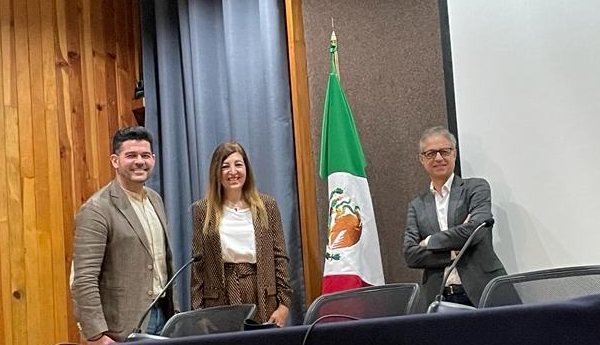Published in ConnectED Newsletter - Volume 6 - Issue 4 - June 2023
Francisco Salgado-Robles (Associate Professor of Spanish Applied Linguistics, Secondary Spanish Education Program Director, and Lower Division Spanish Program Coordinator) recently co-presented a paper entitled “A Transcultural Examination of U.S. Spanish Heritage Speakers Abroad” at the Annual Research Seminar Series on Spanish Applied Linguistics, hosted by Universidad Nacional Autónoma de México (UNAM). A collaboration with Prof. Nora Basurto (Universidad Veracruzana, Mexico) and Prof. Francisco Lorenzo (Universidad Pablo de Olavide, Spain), the project investigated the intercultural competence of U.S. undergraduate heritage language learners of Spanish studying abroad in Spain. Using data from surveys, reflections, intercultural development inventory (IDI), and semi-structured interviews with participants, the study assessed the preparation of heritage language learners for study abroad. The results provide specific recommendations for home and host institutions about ways to redesign heritage language classroom in an attempt to boost the intercultural competence of such participants more effectively in our global society.
While in Mexico City, the research team co-presented another paper entitled “Teaching Spanish for Specific Purposes to Heritage Speakers” at the Annual Research Seminar Series on Language, Education, and Culture, hosted by Universidad Autónoma Metropolitana (UAM). Prof. Salgado-Robles explains that, as the number of Spanish heritage language learners continues to increase, this student population finds advantages in their bilingual ability and multicultural identity at the end of their studies and upon entering the job market. As such, the courses focused on Spanish for specific purposes have led to a growing interest in the profile of this student body, even in those who have had minimal contact with Spanish as a specialty language in academic and professional registers. The presentation offered a solid point of reference in the field of teaching Spanish for specific purposes to Spanish heritage language learners (HLLs): first, the origins, evolution, and areas of Spanish for specific purposes teaching were outlined; next, a discussion about academic language and professional communication environments of Spanish HLLs was presented; and, finally, specific pedagogical features of Spanish for specific purposes for heritage speakers were provided.
Both presentations resulted from an interuniversity (Universidad Pablo de Olavide, Universidad Veracruzana, and City University of New York) project entitled “Bilingualism and Biculturalism amongst Three Cross-Cultural Populations of U.S. Spanish Heritage Speakers: Spanish Learners in New York City, 'Returnees' in Mexico, and Study Abroaders in Spain.” This project has been partially financed by the European Union’s European Regional Development Fund.
Last Updated: 06/01/2023 17:31
